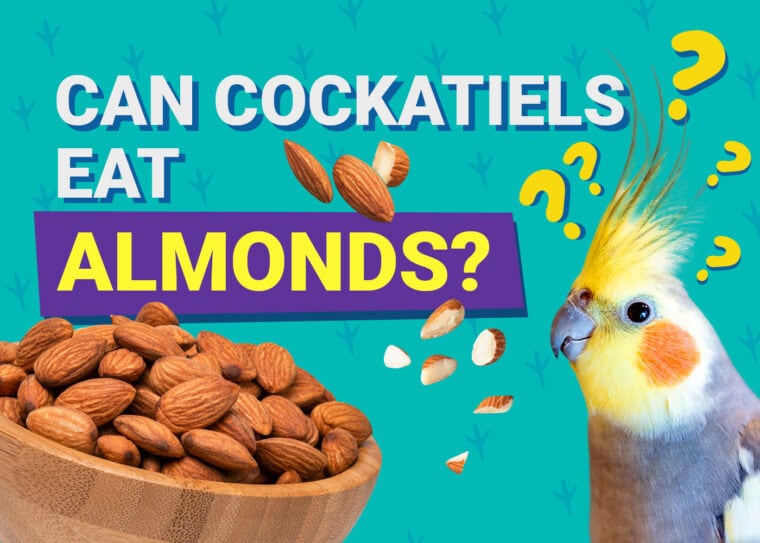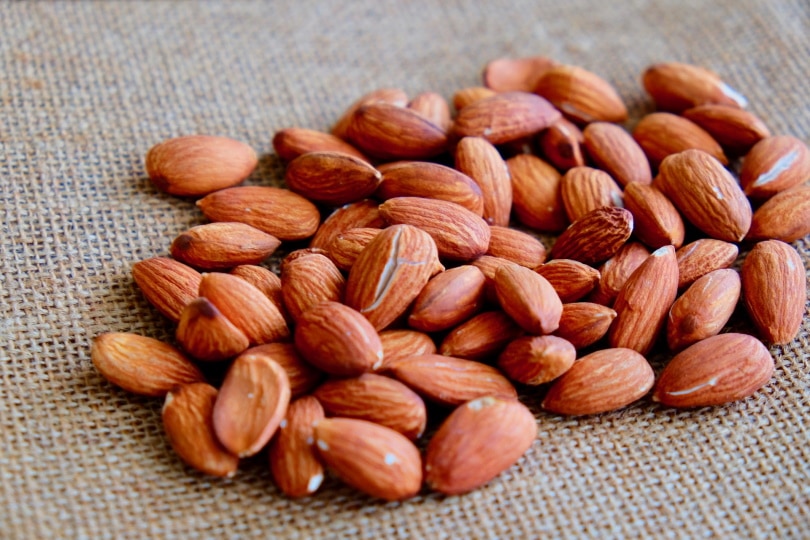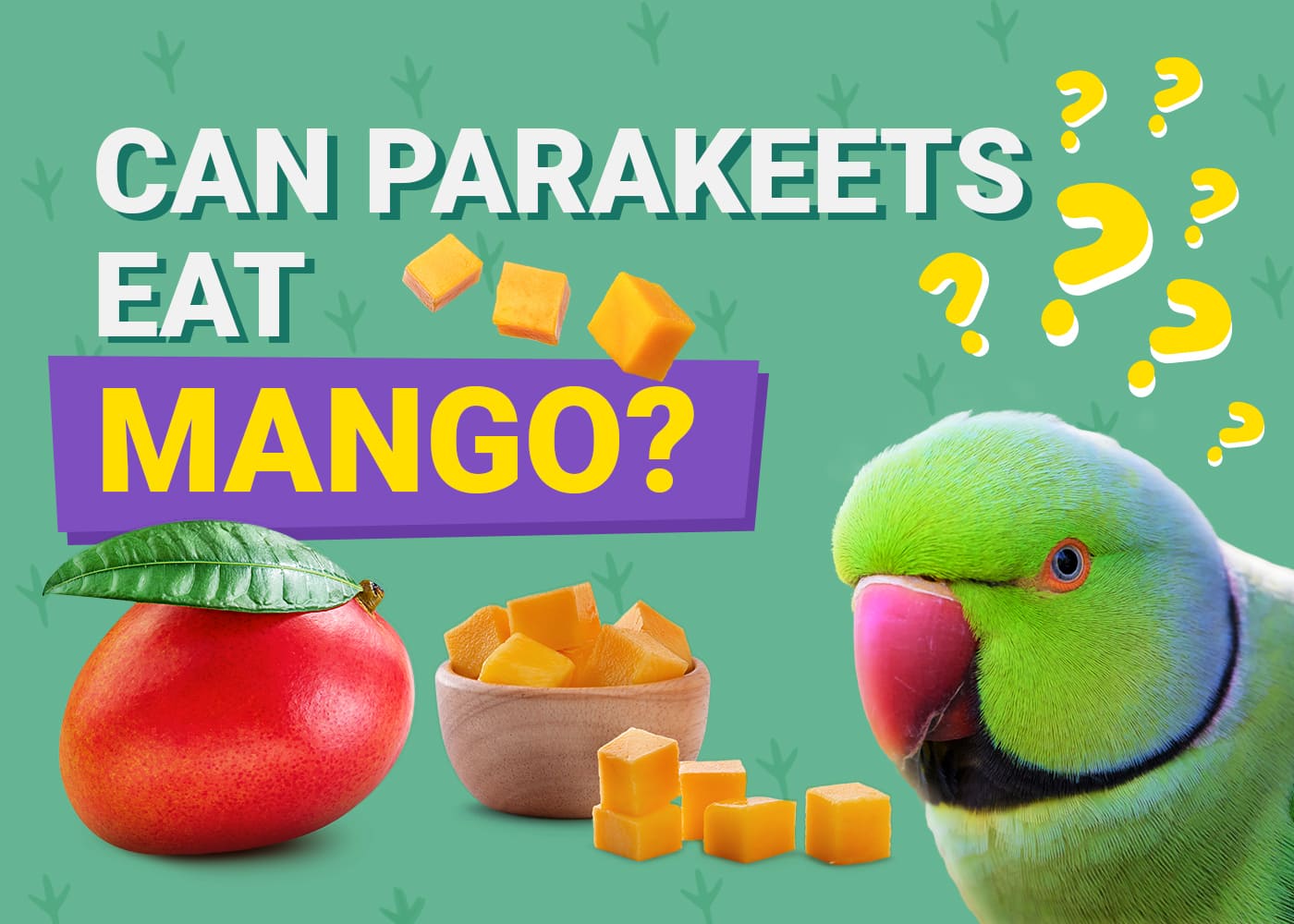
Click to Skip Ahead
The loveable cockatiel is a popular pet bird and among the smallest of the cockatoos. What they lack in size, they more than make up for with their personality and antics. They form long lasting bonds with their owners, come in a variety of colors, and are easily tameable. As with all pets, a big part of their care is ensuring they receive the right nutrition. For cockatiel owners, this can be tricky, as tamed birds often try to sample and eat the same things their humans do.
Almonds are a popular nut that your cockatiel might show interest in. If you’re wondering whether it’s safe to give them almonds, the good news is that yes, cockatiels can safely eat almonds. Read on as we explore this nut in greater detail.
A Pet Cockatiel’s Diet
The diet of cockatiels kept as pets is vastly different from the diet of their wild cousins. In the wild, cockatiels are classified as nomadic granivores. This means they constantly fly around their home range and feed mostly on seeds and grains. Observations of cockatiels in the wild suggest that they consume over 60 different species of seeds. They may also consume certain fruits, vegetables, and a grub or two. Though omnivores in a technical sense, they’re mostly herbivores on a daily basis.

Issues With All-Seed Diets
When kept as pets, meeting the nutritional requirements of these birds can be challenging and nearly impossible to do so by seeds alone. Not only are the various seeds wild cockatiels eat difficult to attain for those kept in captivity, captive birds often don’t get as much exercise as their wild counterparts do.
Consuming a seed-only diet often results in an overweight pet. In addition, many seeds grown commercially for human consumption have a different nutritional profile than the seeds wild cockatiels would forage on. These nutritional differences can lead to both an excess of certain nutrients and a deficiency of other nutrients. Consequently, seeds aren’t considered ideal for pet cockatiels.
Feeding your cockatiels the wrong mixture of seeds can be dangerous to their health, so we recommend checking with an expert resource like The Ultimate Guide to Cockatiels, available on Amazon.
This excellent book will help you balance your cockatiels’ food sources by understanding the value of different seed types, dietary supplements, fruits and vegetables, and cuttlebone. You’ll also find tips on everything from housing to health care!
Pellet Diets for Cockatiels
Commercial pellets have the potential to form a very good base of your cockatiel’s diet, because their formulation can be controlled and therefore, they can be designed to meet most of your cockatiel’s nutritional requirements without compromising their health. Prevailing veterinary advice is to have a pellet as the base or bulk of your cockatiel’s diet.
However, the complexity of a bird’s nutritional requirement means that no pellet is truly sufficient on its own for their diet. All pet parrots, including cockatiels, need their diet supplemented with certain foods. These include vegetables, nuts and other sources of protein and fats, legumes, pulses, seeds, and fruits. These supplements should form around 20–25% of your cockatiel’s diet, and should be highly varied, cockatiel-safe foods which are rotated around on a daily basis. The remaining 75–80% of their diet should be a pellet base.

Where do almonds fall in all this? Being a nut, they are to form a small portion of your cockatiel’s diet. When given in appropriate amounts, they are a healthy addition to their diet.
 Almond Benefits for Cockatiels
Almond Benefits for Cockatiels
The primary benefit of almonds in your cockatiel’s diet is that, like most nuts, they are a highly nutrient dense source of fats and protein. Almonds also contain various other micronutrients in the form of vitamins and minerals, however, given how almonds would only form a small portion of your cockatiel’s diet, these benefits, while present, aren’t as significant as their protein and fat contribution.
In addition to their nutritional benefits, almonds offer your cockatiel enrichment by adding variety to their diet. This is because they can be served in many ways to your pet, and, as most pet bird owners come to quickly realize, your cockatiel might have a preference for a certain type of presentation. Serving almonds according to your cockatiel’s preference can definitely add an element of enrichment to their day.
Almonds are also not as messy as some other fruits and vegetables, and can easily be incorporated into pet bird puzzles, which can keep your pet engaged for long periods of time without the risk of them ingesting spoiled food.
Finally, their long shelf life means that they can be bought in bulk and stored for later use, which usually makes them more economical than some other fresh foods.

Types of Almonds & Their Safety
Most almonds found in grocery stores are intended for human consumption and therefore, they must be carefully considered before offering them to your cockatiel. The safest choices are shelled raw or toasted (unseasoned) almonds.
A note about almond shells: though most cockatiels would have no issues making their way through an almond’s shell, the shells of most nuts may periodically contain molds which can be detrimental to their health. This is why some shelled nuts are not recommended for cockatiels. Peanut shells, for instance, aren’t necessarily tough for a cockatiel to break through, but pose a similar risk.
How Many Almonds to Feed Your Cockatiel
As mentioned above, almonds shouldn’t form a large bulk of your cockatiel’s diet but should rather be considered a treat. An almond or two served as your bird’s nut quota for the day is usually sufficient. It can either be ground and sprinkled on top of their pellets, or sliced (depending on your bird’s preference).
Molting birds, birds that are breeding, and birds that are still growing (juveniles) usually have a higher nutritional requirement and can be fed more almonds. However, it is best to consult with your avian veterinarian to figure out exactly how much you should feed your cockatiel.
As with all nuts, overfeeding will result in a bird that feels too full but likely will be deprived of some nutrition. Therefore, this often spirals into health issues over time, such as feather plucking, obesity, poor molting, and such.

What About Almond Milk?
Plant-based milks are rising in popularity as an alternative to dairy products. Though the amount of almonds in most almond milk is actually very low, you should always read the entire ingredient list on the product before deciding to offer it to your cockatiel. Many almond milks contain emulsifiers in the form of oils or other stabilizers to ensure that the almond doesn’t separate from the water in the container. As a general rule, when unsure, it is best to not give your cockatiel almond milk.
Conclusion
A nutritionally balanced diet for cockatiels requires more than just pellets. The addition of nuts is not only a form of enrichment but considered a necessity for their diet. Almonds are a safe addition to a cockatiel’s diet. However, like all nuts, they should be offered in moderation.
Questions about your cockatiel’s nutritional welfare should be discussed with your avian veterinarian. This ensures that your cockatiel is receiving proper amounts of food on a daily basis to ensure good health and proper growth and development.



 Almond Benefits for Cockatiels
Almond Benefits for Cockatiels





